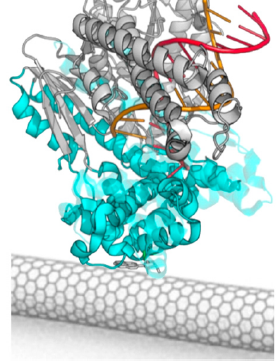Atomistic modeling of nano-scale Field Effect Transistors made of low-dimensional materials for single biomolecule Sensing
Leuven | More than two weeks ago
Explore the potential of ultra-sensitive low-dimensional biosensors
With significant progress in CMOS technology, nano-scale Field-Effect Transistors (FETs) with dimensions down to a few nm can be manufactured nowadays. Also, novel low dimensional materials such as carbon nanotubes (CNT) or 2D materials are being actively investigated as replacement of silicon channel transistors. This has opened doors not just for better computing but also for areas like ultra-sensitive bio-sensing, e.g., for genomics and proteomics, where both the miniaturization and alternative materials are expected to improve the sensitivity and potentially allow for single biomolecule detection. Large-scale integration of arrays of nanoscale transistors could provide for massive parallelization and deliver a more complete view of a biological system at low cost. Several challenges still need to be tackled to achieve such a large-scale bio sensor chip.
At device level, fundamental understanding is needed to quantify the impact of quantum effects, and better transport properties of low-dimensional materials on the sensitivity. E.g., in a CNTFET, the biomolecule current modulation mechanism may be enhanced compared to less ballistic silicon devices. To capture the target biomolecules on the FET, the surface of the transistor needs to be functionalized with probe molecules that can bind with the target biomolecules floating around in the electrolyte solution. This surface functionalization and the binding can influence the sensitivity of the FET, which is important to understand to achieve a low limit of detection.
Advanced ab-initio atomistic modeling, such as Density-Functional-Theory (DFT), combined with quantum transport simulations, allow for studying the intricate impact on the bioFETs of novel materials, including the material-dependent impact of the molecules linked at their surfaces. The proposed work relies on the use of state-of-the-art DFT tools (Quantum Espresso, CP2K...) combined with our advanced dissipative ab-initio atomistic Non-Equilibrium Green’s Functions (NEGF) simulator, ATOMOS [1,2], augmented to model the specifics for biosensing (e.g., electrolytes) [3], to explore the fundamental physics and electronic and transport properties of biosensors made of these novel materials including an atomistic description of the grafted linkers and biomolecules. Your results will be compared and help optimize biosensing devices fabricated in our state-of-the-art cleanrooms. You will work with a multi-disciplinary team of researchers specialized in atomistic modelling, device design and biosensing, including experimentalists fabricating and characterizing the biosensors.

[1] Afzalian, A. Ab initio perspective of ultra-scaled CMOS from 2D-material fundamentals to dynamically doped transistors. npj 2D Mater Appl 5, 5 (2021). https://www.nature.com/articles/s41699-020-00181-1
[2] A. Afzalian, E. Akhoundi G. Gaddemane, R. Duflou and M. Houssa, Advanced DFT–NEGF Transport Techniques for Novel 2-D Material and Device Exploration Including HfS2/WSe2 van der Waals Heterojunction TFET and WTe2/WS2 Metal/Semiconductor Contact, in IEEE Transactions on Electron Devices, vol. 68, no. 11, pp. 5372-5379, Nov. 2021.
[3] Afzalian A., Flandre D. Ultra-Scaled Si Nanowire Biosensors for Single DNA Molecule Detection. Sensors 2023, 23, 5405.
Required background: Physical/Electrical/Electronic/Material Engineering, Physics or Chemistry
Type of work: 50% DFT simulation of material and bio-molecules, 40% NEGF device simulations, 10% literature
Supervisor: Pol Van Dorpe
Co-supervisor: Aryan Afzalian, Koen Martens
Daily advisor: Sybren Santermans
The reference code for this position is 2024-167. Mention this reference code on your application form.
